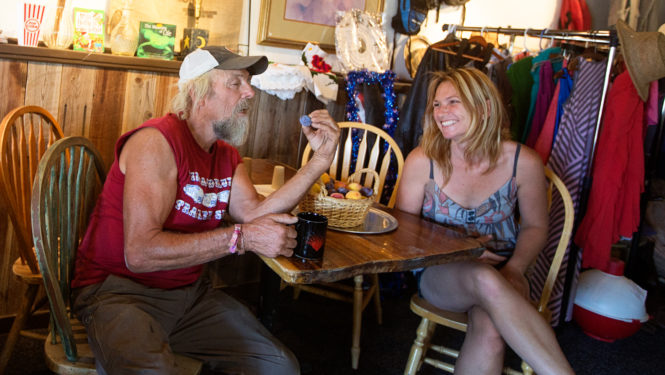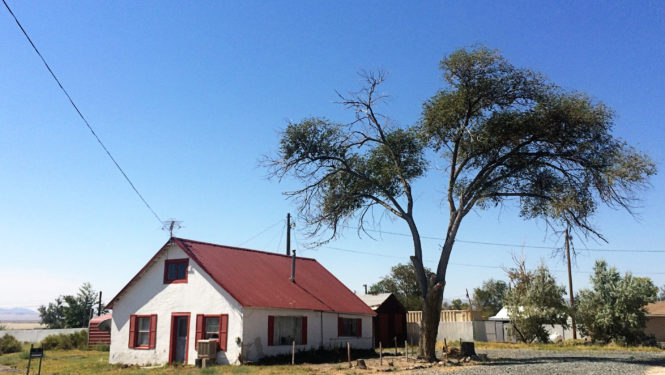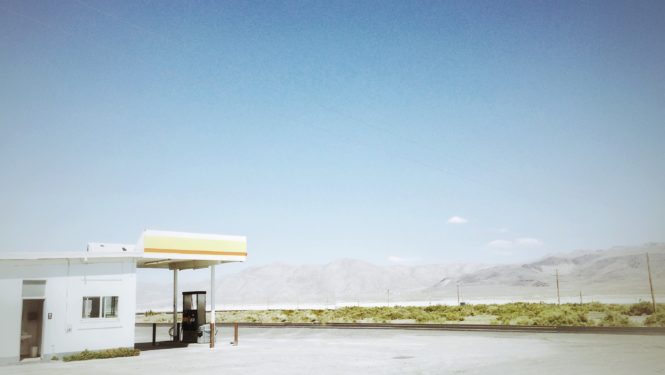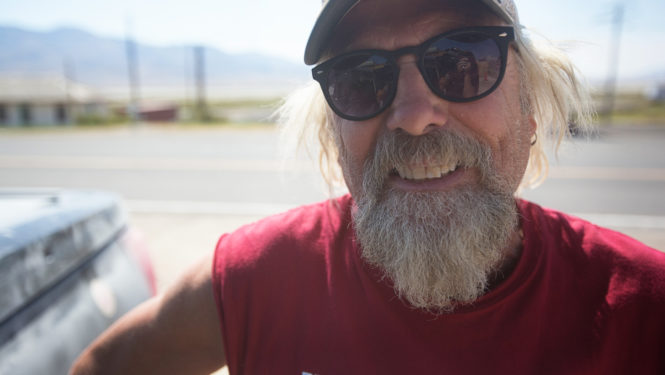Every now and then you get a reminder of where you are on the planet as you sit and work and play in the dust of the Black Rock Desert.
The reminder usually comes when you make your way back into the town of Gerlach – to pick up a package, visit the office, maybe do a load of laundry. That’s when you remember that you’re at the end of one world and at the beginning of another – “Where the pavement ends and the West begins,” as the sign outside town says.
And that’s true in a larger sense, too — Gerlach is either hanging on by its fingernails, helplessly watching as its population shrinks, or it’s at the beginning of some big new thing. The Burning Man Project has purchased Fly Ranch, just outside of town, and its hot springs and lush greenery and who knows what intellectual fervor may eventually draw hundreds or even thousands of seekers and searchers to the desert.
But maybe there’s a third possibility. Maybe Gerlach is just one of those places where the good times always seem to be just around the corner, but they never quite arrive. Maybe it felt like this when people starting finding gold in the hills, or when the gypsum plant and mine were humming in next-door Empire, or when the racing teams would rocket across the flat and barren playa, vying for the land speed record.
Now it’s Burning Man’s turn to provide a glimmer of hope, a hint of better times. Maybe people will come, thinking their great thoughts, and they will be struck by the beauty of the place, and they will feel the magic and majesty of the hills, and they’ll do anything they can to get here, and when they get here they’ll do anything they can to stay.
But for now, as you sit in your house or your trailer, and the wind begins to blow, and it finds its way through smallest of cracks, it makes that high whistling sound that says you are in an empty, desolate place, and the sound is the sound of loneliness, and maybe even despair.
—
Lacy has put fresh fruit on the counter of her new coffee shop in Gerlach. She’s moved into Quinn’s old pizza place on Main Street, and she’s expanded her offerings to include clothing and thrift-store finds and other bric-a-brac that’s artfully displayed around the bigger space.
Lacy still works at Bruno’s, but there are many changes there, and one of them is reduced hours, and another is reduced staff. So she’s supplementing her income with the coffee operation, which is open for business during the Burning Man season.
“We have fresh muffins every morning,” she says proudly. “And fresh biscuits for the sausage and biscuits.”

We hear later that there’s a dispute about whether and what food she can serve, but for now, we buy one of the small, locally grown watermelons, and it’s delicious and sweet and refreshing.
Bruno’s has gone through a transformation. Bruno Selmi, one of the patriarchs of the town and whose family owns most of the businesses, is in his 90s now, and he’s not around as much. His grandson Willie has taken over many of the day-day-day operations of the café, bar and restaurant that bears Bruno’s name and is the only eating spot for 90 miles in any direction. There’s a fancy new horseshoe bar and upscale café tables with food service in what used to be strictly a bar, and a roll-down garage door separates the bar/restaurant area from the café. The bartenders sling both drinks and food now, but the doors don’t open till 10 am, so you’ll have to make other arrangements for morning coffee, should the need arise.
“It’s ok by me if Bruno’s doesn’t want to open until 10,” Lacy says happily.
—
Flash is standing in a parking lot outside the Miner’s Club, talking and gesturing to a small group of people who talk and laugh and shout in reply. Flash has that kind of effect on people – he’s an animating force.
Flash is many things to Gerlach, and to Burning Man. He was around at the beginning, creating art on the playa with Pepe Ozan even before Burning Man was here, and, he says, “… I brought Larry to the playa.” That would be Larry Harvey, of course, who first set fire to a Man on Baker Beach in 1986, and who’s still setting fire to a Man 30 years later in the Black Rock Desert.
Flash was with Pepe and the Desert Site Works artists when they staged things like the Human Chess Game, and Pickup Truck Polo “… and if you didn’t care about your pickup truck, that was a good experience,” Flash says now.
So Flash can give you a sometimes-mythological account of how things used to be, and maybe serve as an advance scout for where Burning Man is going. He is a great friend of Larry’s, but he does not drink the whole glass of Kool Aide that the organization is offering.
Flash has many significant art projects on his resume, yet he has also created a rag tag trailer empire that has a large presence at Burning Man. “I’ve always had trailers,” he says, and you get the idea that he always will. He is wildly enthusiastic about things great and small, and about you. His trailers are not fancy – it is against his principles, apparently, to provide water or air conditioning. A manifesto taped to the wall inside of each trailer says:
Science and technology has deprived most of the world of its gods, religions, its sense of meaning and permanence. Dostoyesky called it aesthetic materialism. “It lulls the human soul into material comfort, thus vanishing the tragic sense of life.”
No Shower
No Toilet
No Regrets
You are a Siddartha
—
Flash says he is “cursing myself to this day” about helping relocate Burning Man to the Black Rock Desert. “Why not Hawaii??,” he asks, laughing uproariously. “Maybe the Lost Coast, even. Why not someplace with water??” No, he helped Larry come to this barren, dusty place, where people come to forget, or be forgotten, or both.
—
Gerlach’s general reaction to Burning Man’s purchase of Fly Ranch has been … muted, at best, indifferent at worst. It just doesn’t seem to matter very much.
But maybe that’s not surprising, because hopes have been raised before, without much coming of it. In the early years, Gerlach didn’t want Burning Man, and they did their best to stop it. But Larry Harvey had the brilliance to send Flash to live in the town and cultivate relationships with the locals. And Flash succeeded in that beyond all imagining.
Flash started a Chamber of Commerce. He (and Larry) wrote letters to the local papers, expressing profound support for Burning Man from a local Gerlach resident. He arranged visits with the governor, who shared his animosity towards the meddling BLM. He joined up with the race teams, with Craig Breedlove and then with Richard Noble, who eventually broke the land speed record in the Black Rock Desert in 1997.
And there was one other thing that helped Burning Man win over the locals: The wild ones who came here in the early days liked to bring their guns with them. “That’s what kept the locals at bay,” Flash says. “It wasn’t just hippies out here, it was hippies with guns! Redneck hippies!”
Flash also became a business owner. “I had the Black Rock (Saloon), and I had Bev’s, and I was going for Jalisco’s — I was going to give Bruno a run for his money.” But that all ended very suddenly, and dramatically, one afternoon, when a woman who had done some cooking for Flash shot him in the street. He had criticized the way she made her fried chicken. She got him in the leg, and the story goes that Flash stumbled into the Black Rock Saloon to announce: “I’ve been shot! Give me a whiskey!” The local sheriff, who was not a fan, was told of the shooting, and he said, “It’s my day off.”
Flash says, “The afternoon before I got shot, I was saying to Larry, can I come home now? … I’m tired. And he said well maybe you should — you’ve got the town in a riot. I told you to go out there and live, not buy the town!”
“(The shooting) ended my political career,” Flash says now.
He wanted out, and now he was.
“I never wanted to do just one thing,” he says, explaining why he didn’t sign on when Burning Man incorporated itself and named official founders and started its journey out of chaos, morphing into an art organization with worldwide ambitions.
“For me, I knew that I wanted to do other things, too, I didn’t want to be stuck with this just one thing. … I was never much of a joiner, so for me, it was, I did this thing, I’m still doing it, I’m loving it … but you see it for what it is, and you play it that way. But walking away in disgust because it’s gotten bigger, it’s got five more people than it did last week … you know, (the bigness) doesn’t affect anything.”
—-
People from the Burning Man organization have been attending quarterly meetings of Gerlach’s Community Advisory Board ever since the Fly Ranch purchase was announced. They’re interested in letting townspeople know what’s coming, to the extent they even know what’s coming themselves. And the overwhelming response of the locals has been … a shrug of the shoulders. The effort to keep the invaders at bay is a battle that was lost a long time ago.
“When the org wanted to buy the Showers property,” Flash says, speaking of a dilapidated hot springs property in town, “I told them, ‘We’re the Indians, we’re all Indians out here … and the white man is coming over the hill! You’ve got to set yourself up! You’ve got to make some money!’ And they said, ‘Aahhh, you’re scum, you’re a hippy, get outta here.’ And they just didn’t get it. They still don’t get it!”

Maybe they don’t get it, or maybe they’ve just seen it all before, and they just don’t care. People don’t come here to make a better life, or reinvent themselves. They come here mostly to get away. To sit in silence. And for some, maybe, to wait for the end to come.
But that’s not everyone. Papa Nips, who works at the filling station, left the East Coast for good after spending a work season in Black Rock City. He had a health scare, and he realized that this pace, this place, was better.
There’s Limbo Lloyd, an opal miner who lives in a glorified Quonset hut out in the foothills along 447. He says people wonder what he does all day, and he tells them he sits and watches the skies and the sunsets, and the horses walking across the land. He’s never bored.
And there are newcomers like Will and Crimson, two Burning Man founders who have a place in Gerlach now and split their time between here and the Bay Area. Will’s gotten involved with civic and community affairs in the region, and last week again took part in Meteor Camp, the gathering of Black Rock Desert supporters and boosters who gather in the far reaches of the playa for the Perseid meteor showers.
So there are at least some people who are struck by the majesty of the place, in all its harshness. It’s looked the way it looks now for tens of thousands of years, and it will likely look the same way for thousands more. It’s humbling and profound, and it puts a silence on you.
—
“Lacy is tough,” Flash is saying now, standing in the gravel outside Joe’s Club. He’s speaking about Lacy in her coffee shop, who has a couple of more sisters who are due to come to town soon, to help her run things. “One of them’s a coffee expert” she says proudly. She can do the buying and knows about the roasting. She operated a shop with her ex husband, and now she’s coming to help Lacy make a go of it.
We don’t know what’s in store for Gerlach, the little town in the shadow of the big new thing at Fly Ranch. We don’t know how many trailers Flash will amass, and we don’t know how Lacy and her sisters will do with the shop.
But we’ll have that muffin, thank you, and we’ll be heading back out to the desert, and we’ll be thinking the big thoughts, and maybe other people will want to do that, too.



I can’t get enough of these stories; shanks for sharing and keep them coming.
I heard the one about Flash being shot before, but I don’t know where. Danger Ranger? You? Someone else?
Report comment
thanks for reading, and for the kind words. … It was right there in Main Street, Gerlach
Report comment
I also love stories about Gerlach and each year I stop at Bruno’s or take pictures in town. This place is a view of the American west that few are lucky enough to experience. Anyone interested in more info about Gerlach and the origins of Burning Man should read-This is Burning Man by Brian Doherty.
Report comment
yes, i agree, they should read that book
Report comment
Remember to read everything Flash says in a raspy road island accent… “I’ve been shhhhott! Give me—a whiskey!”
Report comment
really great portrait of the town with an honest look at the unlikely symbiotic relationship that has sprung up there.
Report comment
thanks, Christine
Report comment
Fantastic story, John! I love the desert.
Report comment
there’s a lot to like
Report comment
Great writing. I appreciate featuring someone like Flash, who’s been there since the beginning and is still contributing, yet not fully on board with the grander ambitions of the BMORG. Also, just a really nice insight into Gerlach and the strange allure that town possesses.
Report comment
thanks very much for reading. And yes, a strong allure in that town
Report comment
The desert reflects where you are. I never found the winds lonely or despairing. For me, they are the songs of glorious solitude. Thanks for a great read. What happened to the woman who shot Flash?
Report comment
i’d strongly agree with the alternative interpretation of the sound the wind makes. …. And that’s a great question re: the woman who shot Flash. I don’t know what happened to her.
Report comment
first timer…coming in thurs nite ….hopefully the
bar in Gerlach is open till at least midnite!!!
One question is there any water at the playa
that you can purchase “like 5 cold bottles aday
I heard you can purchase ice ??
Thanks
Report comment
I hope you were joking, you newbies really need to do your homework before coming to burning man your first time.
Report comment
I raised my children (one of whom is there right now) with the phrase “Just because you can, doesn’t mean you should.” This is a wonderfully thought-provoking article, not just relevant to Burning Man, but to our world. Thank you.
Report comment
thank YOU so much for reading and giving it a little thought. It’s much appreciated. … Good advice for your kids, too.
Report comment
Flaa-a-ash!
Report comment
I appreciate featuring someone like Flash, who’s been there since the beginning and is still contributing, yet not fully on board with the grander ambitions of the BMORG. Also, just a really nice insight into Gerlach and the strange allure that town possesses.
Report comment
This is a wonderfully thought-provoking article, not just relevant to Burning Man, but to our world. Thank you.
Report comment
Anyone interested in more info about Gerlach and the origins of Burning Man should read-This is Burning Man by Brian Doherty.
Report comment
thats reallyy crazzy :)
Report comment
Lets go thank you for post
Report comment